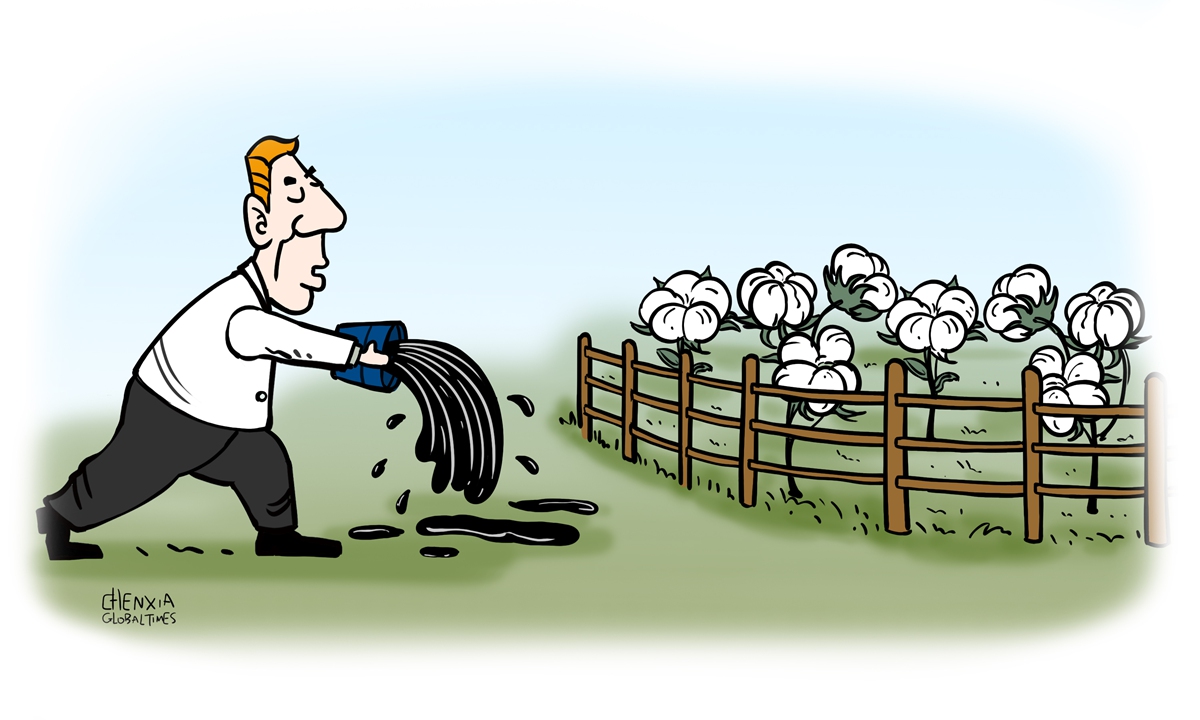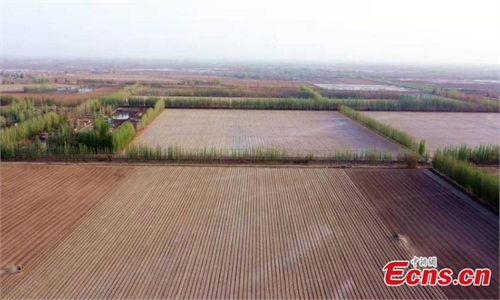
Illustration: Chen Xia/Global Times
The Canadian Federal Court recently rejected an application from activists to overturn a Canada Border Services Agency decision refusing to impose a general ban on imports from Northwest China's Xinjiang Uygur Autonomous Region over so-called "forced labor" accusations.The activists earlier requested the agency to "generally prohibit the importation of goods from Xinjiang," for which the agency argued that it "had no authority to enact such a ban," Canadian Press reported. And the Canadian Federal Court agreed with the Canada Border Services Agency that the latter has no such authority.
Following in the US' footstep, some Canadian forces have been banging the drum for crackdown on Chinese businesses and products under the guise of widely debunked accusations of "human rights abuses" in Xinjiang. Though the Canadian court's ruling does not necessarily mean any policy shift, it did reveal that these anti-China forces simply do not care about evidence or the rule of law. Behind their demand to ban Xinjiang products is pure ideological bias toward China and geopolitical gambits to vilify Xinjiang so as to contain China's development.
The anti-China forces seemingly have built up a complete production line for lies, consisting of so-called independent think tanks fabricating rumors, media outlets turning rumors into stories, politicians proposing crackdowns and activists forcing businesses or institutions to take political actions. The presence of evidence or whether related parties had legal basis to take actions are not important.
However, their lurid accusations and actions cannot hide the truth. Taking the West's notorious accusations over Xinjiang's cotton industry, which they claim is built on "forced labor," for instance, over 80 percent of the region's cotton was picked by machines in 2021. The whole farming and harvesting process of Xinjiang's cotton industry has realized high level of mechanization. Not only that the industry is in no need of a large number of workers, it also has adopted a range of advanced technologies, such as seeding machinery equipped with self-driving technology and BeiDou Navigation Satellite System.
Xinjiang residents, including ethnic minorities, have full freedom to choose their jobs. The region has witnessed rapid development during the past decades. The per capita disposable income of urban residents in Xinjiang reached 34,838 yuan ($5,470) in 2020, 2.41 times that of 2010; while the per capita disposable income of rural residents rose to 14,056 yuan, 2.82 times that of 2010. The regional government allocates more than 70 percent of its general public budget every year to ensure and improve residents' livelihood; a total of 3.06 million rural residents in the region have been lifted out of poverty by 2021.
All these facts make the West's forced labor stories absurd and stand in stark contrast with their own notorious history of violating human rights across the world. From massacring of the Native Americans, slavering Africans to bombing people in the Middle East and pillaging others assets, the US-led West cannot escape blame.
Moreover, such reckless schemes not only hurt the legitimate interest of Xinjiang residents, they also undermine the normal operation of global supply chains. For instance, China is the second largest cotton producer, with its Xinjiang region claiming nearly 90 percent of all the production capacity. Xinjiang cotton has been used in numerous industries from all over the world.
Also, China's global share of solar cell manufacturing, another industry targeted by Western crackdown campaigns, has exceeded 85 percent, with Xinjiang accounting for 57 percent of the national capacity. Cracking down on Xinjiang's solar cell industry would inevitably undermine the global efforts to switch to green energies. All these worldwide fallout appear to be more severe amid the current sluggish global economic environment.
With their anti-China mania, Western anti-Chinese groups would not easily give up the "Xinjiang card," no matter how groundless or danger it is; but the marginal effect of playing the card is diminishing and there are growing number of insightful people in the West who realize that they cannot play along with it. It is hoped that more rational people and groups will stand up and put an end to such a vicious attempt to vilify China.
For Canada, which had singlehandedly brought great tension and uncertainty to bilateral ties with China by illegally arresting and detaining Huawei executive Meng Wanzhou at the behest of the US, it should tread lightly in pushing for more unreasonable provocations against China.
The author is an editor with the Global Times. bizopinion@globaltimes.com.cn



